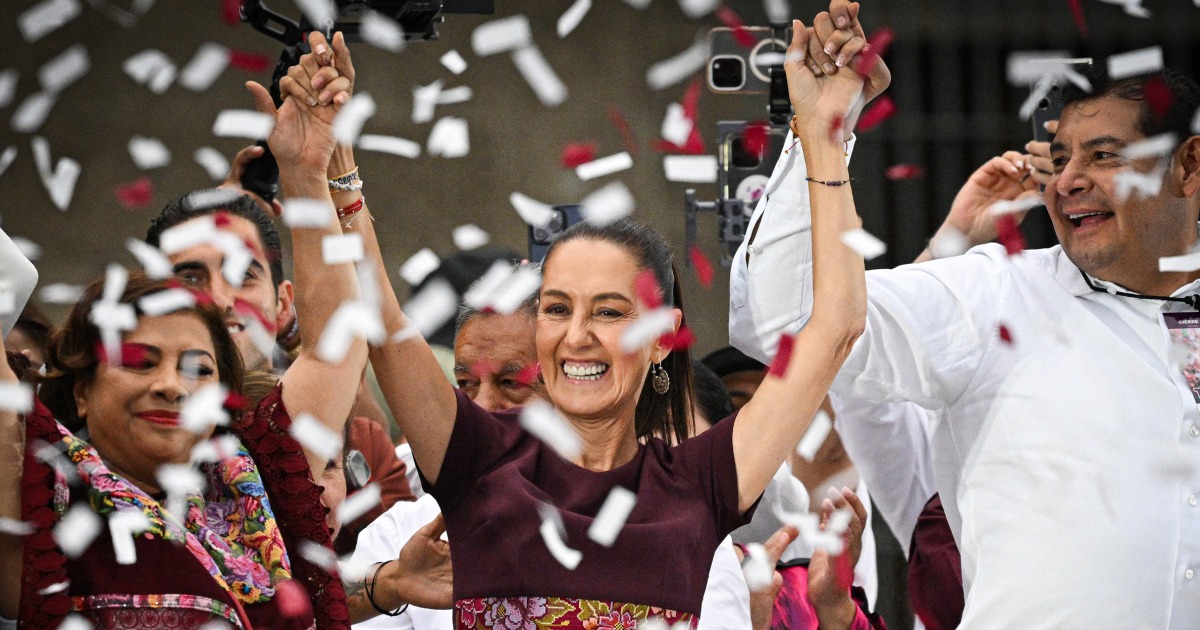Claudia Sheinbaum has made history as the first woman elected president of Mexico, according to projections from the nation’s official quick count.
Sheinbaum obtained between 58.3% and 60.7% of the vote, according to a statistical sample used to conduct the quick count. It was announced early Monday morning by Guadalupe Taddei Zavala of Mexico’s National Electoral Institute. Taddei Zavala said the tally is 95% reliable.
Sheinbaum addressed supporters saying, “For the first time in 200 years of our republic, I will become the first woman president…but as I’ve said in other occasions, I did not get here alone,” she said.
Sheinbaum said would work to build a “diverse and democratic” Mexico.
The former mayor of Mexico City will serve one six-year term starting on Oct. 1.
Sheinbaum, 61, is a physicist and climate scientist and will be Mexico’s first president of Jewish heritage.
Sheinbaum, a member of the governing Morena party, will have an important role in resolving issues that are a priority to the U.S. such as immigration and foreign affairs, as well as determining the future of the trade deal that has made Mexico the United States’ largest trade partner.
Mexico’s National Electoral Institute projected a voter turnout of about 60%, according to the quick count, said Taddei Zavala.
Sheinbaum is largely expected to follow in the footsteps of her mentor, outgoing President Andrés Manuel López Obrador. The leftist Morena party López Obrador founded has come to dominate Mexican politics since 2018, when he was elected by a landslide.
Sheinbaum has promised to keep in place welfare policies and social programs that have helped Morena retain a solid approval rating from voters.
When it comes to combating the country’s high levels of violence, Sheinbaum has said she plans on continuing her predecessor’s “hugs, not bullets” policy of not directly taking on criminal organizations that have gained control over large parts of Mexico as they fight for territory to traffic drugs into the U.S., make money from migrant smuggling and extort residents to fuel their illicit enterprise.
López Obrador’s policy has not significantly helped reduce killings over the past six years, as Mexican government data shows that at least 102,400 homicides have been reported in that period. But the data also shows that the strategy of López Obrador’s predecessors — pursuing drug lords in an all-out war — did not improve safety either.
In a slight departure from López Obrador’s stances, Sheinbaim has called throughout her presidential campaign for a greater use of renewable energy.
From environmental chief to mayor — to highest office
Sheinbaum’s political career began in 2000, when she became Mexico City’s environment chief under then-Mayor López Obrador. She then served as López Obrador’s chief spokesperson during his failed 2006 presidential bid. In 2015, she was elected to run Mexico City’s largest borough, Tlalpan. And three years later, Sheinbaum made history as Mexico City’s first first female mayor.
She’s the daughter of a chemical engineer father and a cell biologist mother and has credited them with her love of science and politics. Sheinbaum studied physics and has a Ph.D. in environmental engineering. As a member of the United Nations’ Intergovernmental Panel on Climate Change, Sheinbaum is among the scientists who shared a 2007 Nobel Peace Prize for their report.
Growing up in Mexico City, Sheinbaum took ballet and guitar lessons as a child. At 15, she volunteered to help groups of mothers searching for their missing children, a long-standing issue in Mexico.
In the 1980s, Sheinbaum became active in student movements and joined protests against state intervention in education policies. She earned her doctorate in energy engineering from the National Autonomous University of Mexico in 1995. After that, she pursued a career as an academic.


